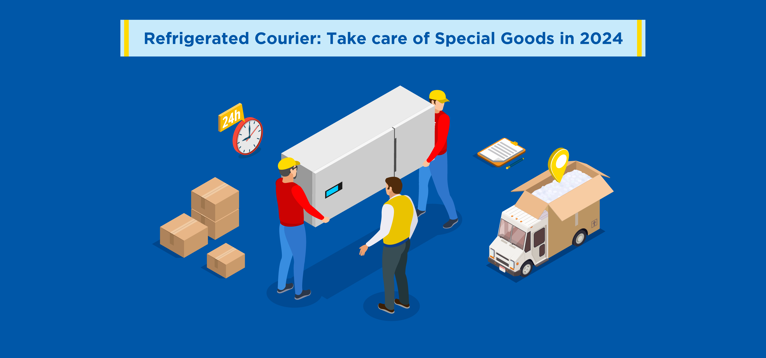When it comes to perishables, time is the enemy. Whether it's fruits, veggies, pharmaceuticals, dairy, seafood or even delicate artwork, maintaining the integrity of temperature-sensitive shipment isn't a walk in the park. You can have a flawless production line, but if your goods lose spark en route to market, it's all wasted efforts. That's where robust refrigerated couriers come in.
This article delves into the challenges associated with transporting special goods. We’ll also see how refrigerated couriers address them and offer seamless delivery.
What are Refrigerated Couriers?
Refrigerated couriers, a.k.a cold chain logistics services providers, are specialised courier services. They specialise in offering transportation for temperature-sensitive goods. Refrigerated delivery is a “cool” way of cargo shipping to move goods that need special care. Think of it as a high-tech fridge on wheels. The vehicle has a built-in cooling system. It keeps your goods at the right temperature, from farm to fork or factory to pharmacy.
Understanding the Need for Refrigerated Couriers
The need for refrigerated couriers has grown, thanks to the rising global trade. With the chilled transport market value at 17.09 billion USD in 2022, a projected CAGR surge of 5.5% will skyrocket to 23.57 billion USD by 2028.
And why not? Traditional transportation can't always protect goods, causing spoilage and losses. Quick and cool refrigerated couriers bridge this gap. With their refrigerated transport solutions, businesses can expand their markets far and wide.
Here are more reasons why refrigerated couriers excel in the global supply chain:
1. To zoom across the global supply chain
Deadlines breathing down your neck, competitors nipping at your heels. It’s a common scenario that business owners encounter almost every day. With the quick distribution offered by refrigerated international couriers, you can—
- Slash time-to-market for new products
- Save on storage costs and
- Free up capital
Plus, you'll be agile enough to tackle market changes and stay ahead of the competition. In hot and humid places like Australia, a fast refrigerated courier service is a productivity must-have!
2. To fuel the growth of the pharmaceutical and life science industry
Pharmaceutical companies rely on refrigerated delivery to keep their products safe. Their intricate supply chain includes shipping between facilities while maintaining temperature control throughout. Transport companies must maintain clean trucks to protect products like vaccines during transit.
All vehicles used for chilled transport follow strict safety standards set by the International Federation of Pharmaceutical Manufacturers & Associations (IFPMA). Refrigerated couriers follow these standards, leading to significant growth in the pharma industry.
3. To open new horizons for businesses
Refrigerated couriers emerge as a savvy route to tap into fresh markets. Picture your goods cruising in refrigerated trucks, expanding your reach. All without the fear of spoilage or delays commonly seen in traditional shipping.
The result? Less waste, more savings.
Interestingly, refrigerated delivery often costs less than standard methods depending on the cargo. It helps you trim shipping costs while hitting that sweet spot for you and your customers. With this approach, businesses can focus on growth and innovation.
4. To navigate compliance with ease
When transporting food, following regulations is crucial. When transporting food, following regulations is crucial. In Australia, the food safety standard (>3.2.2) mandates safe transportation. It protects food from contamination and keeps hazardous items at the right temperature.
Moreover, businesses must adhere to global HACCP certification standards. Refrigerated delivery helps you meet regulations, save costs, and enhance efficiency.
To ensure cold chain integrity, refrigerated couriers must know regulations from:
European Union
World Health Organization
Parenteral Drug Association
International Air Transport Association
Pharmacopeia
5. To meet the demand for fresh goods
In a borderless business world, companies are revamping supply chains for quick responses. As markets sizzle, refrigerated courier steps up to fulfil the global craving for fresh perishables. Refrigerated courier steps up to satisfy the global craving for fresh perishables. With tech upgrades in the past decade, chilled transport is safer and more efficient, even for long hauls.
Types of Temperature-Controlled Transportation That Refrigerated Couriers Use
1. Refrigerated Vehicles
Refrigerated vehicles are regular vehicles with cooling superpowers. Their built-in refrigeration systems provide a consistent, cool environment. It keeps the products in their pre-shipped condition.
2. Active Shipping Containers
Active temperature-controlled containers have built-in cooling and heating systems. They use generators or batteries to regulate temperature for precise shipping. Sensors inside monitors and remote telematics systems control the temperature. Perfect for long hauls where continuous monitoring is crucial.
3. Passive Shipping Containers
They regulate temperature using cooling agents like dry ice or gel packs. Unlike active units, passive containers hold temperature for an extended period without charging.
4. Temperature Controlled Air-Freight
It's the go-to for temperature-sensitive cargo. Known for its speed and convenience over long distances, it covers commercial and dedicated airlines.
Advantages of Using Refrigerated Couriers
1. Extended Shelf Life
Chilled transport slows down spoilage-causing microorganisms, extending product freshness. This allows goods to travel extensively worry-free, enabling businesses to expand their reach.
2. More Profit
With refrigerated couriers, businesses can haul more goods farther. And with perfect temperatures, less stuff goes to waste – profits shoot up.
3. Regulation Ready
Dealing with perishables means dealing with regulations. Chilled transport ensures proper temperature control, reducing compliance risks and safeguarding reputation.
4. Quality's Best Friend
Temperature monitoring is the key to top-notch quality. During refrigerated delivery, businesses monitor products to prevent spoilage and maintain optimal conditions.
5. Versatility
Refrigerated international couriers don’t discriminate. They're not just for food – they're perfect for medicines, art, chemicals, plants, and more.
6. Happy Customers
Delivering top-notch products establishes a reputation for quality and reliability. It also attracts a loyal customer base. Happy customers are more inclined to recommend your business to others. That's the recipe for increased sales and success!
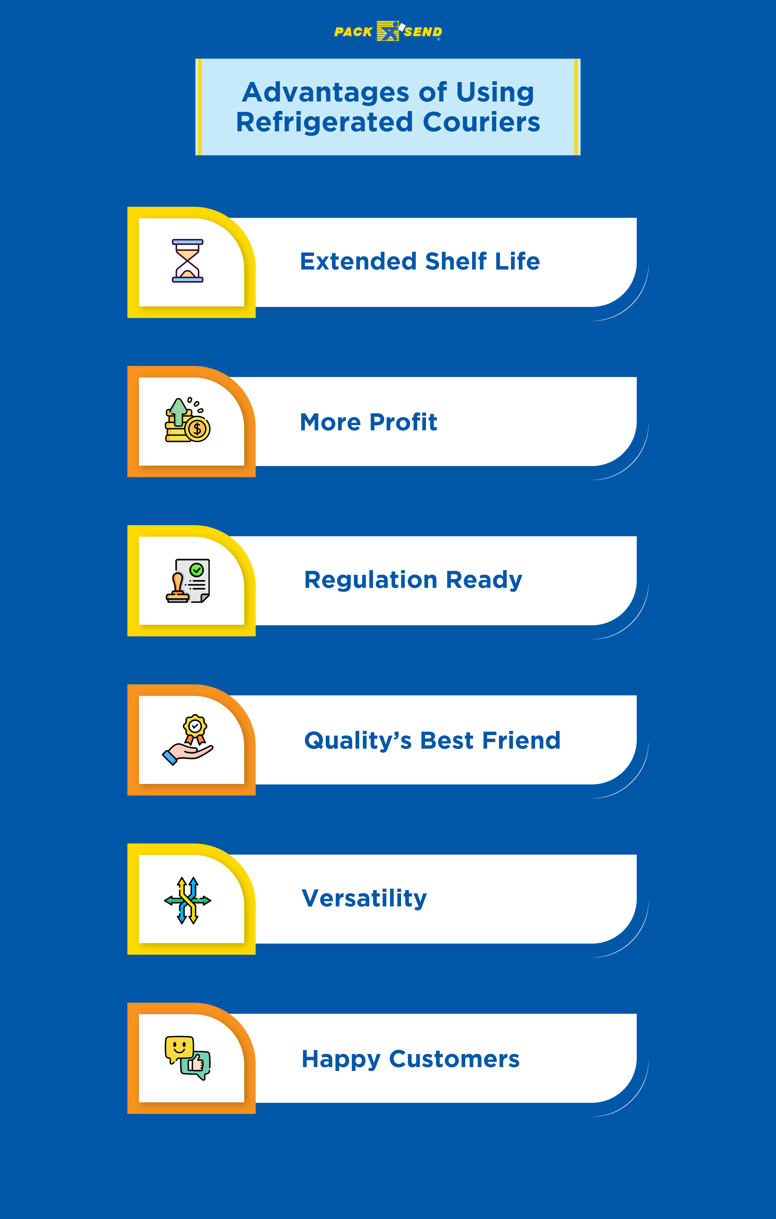
The Refrigerated Delivery Cycle: The Journey of Keeping Things Cool
When moving goods with refrigerated courier services, there's a whole process involved – from cargo preparation, transportation to delivery.
1. Cold Chain Packaging Solutions
Various packaging components come into play to safeguard temperature-sensitive goods during transportation and storage. These packing solutions include:
Insulated Shippers
These containers are constructed from materials such as expanded polystyrene or polyurethane foam. Their design minimises heat transfer and maintains stable temperatures for the enclosed goods.
Gel Packs and Ice Packs
These packs are pre-frozen and then placed within the packaging. They absorb heat, ensuring the desired temperature is upheld.
Vacuum Insulated Panels (VIPs)
They reduce heat transfer and enhance insulation, commonly used in temperature-controlled packaging.
Phase Change Materials (PCMs)
These substances absorb and release thermal energy, sustaining consistent temperatures within the packaging.
Dry Ice
Solid carbon dioxide delivers extreme cooling. It’s best suited for maintaining very low temperatures in packaging.
Refrigerated Containers
Refrigerated containers offer built-in cooling systems. Ideal for precise temperature control for large shipments or long journeys.
Temperature-Controlled Packaging Systems
Advanced solutions incorporate active cooling or heating elements. This, along with sensors that regulate the temperature within the packaging.
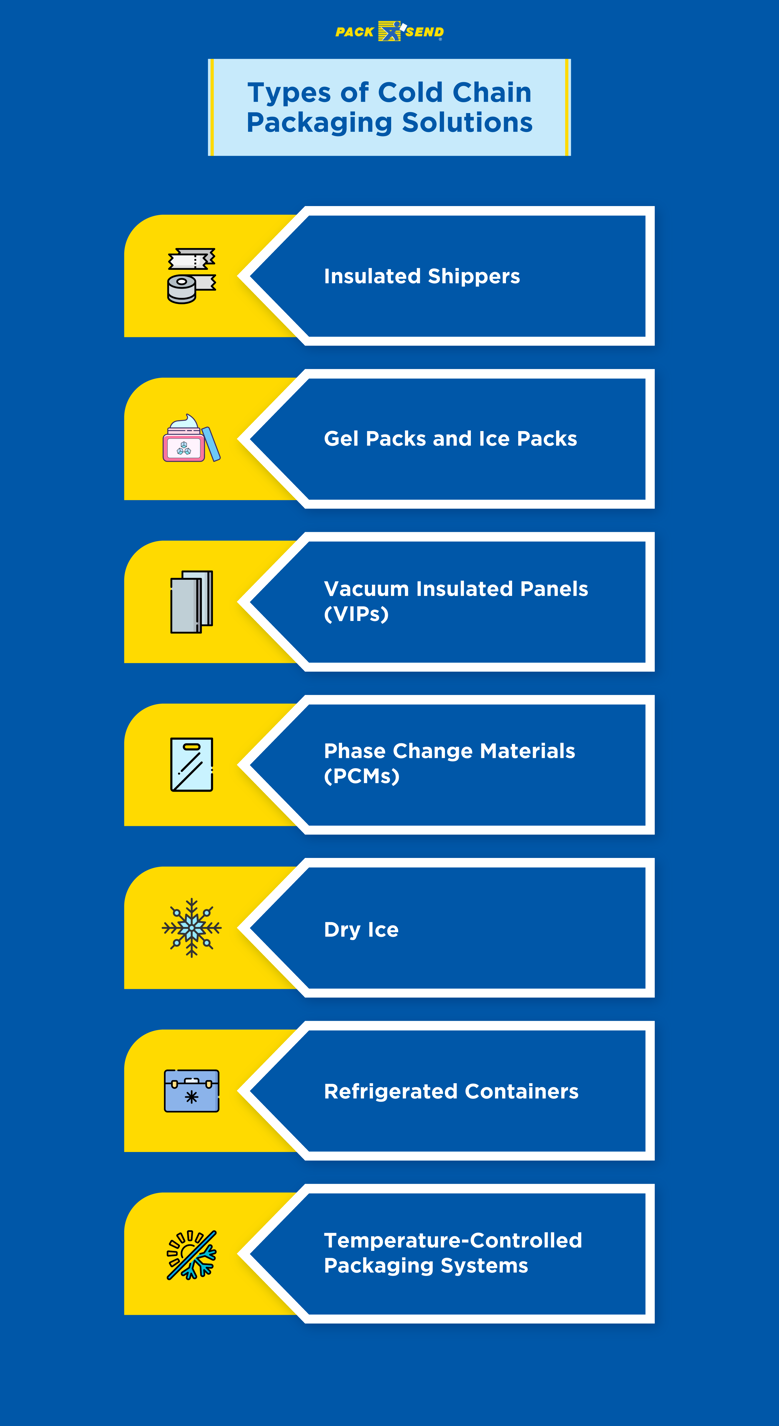
Choosing the right chilled transport packaging ensures the integrity of temperature-sensitive goods across the supply chain. It hinges on product requirements, transport duration, and temperature needs.
2. Storage Under Temperature-regulated Conditions
After production, perishable items need cold storage until they're sent out to customers. They require specific temperature conditions, shielding them from temperature shifts and power disruptions.
Cold storages are purpose-built to keep temperatures below 4 degrees Celsius. This temp range inhibits bacterial or microbial activity onset in stored goods.
Businesses have two options for managing their cold chain logistics. They can either have their own cold storage facility or hire a 3PL provider.
3. Chilled Transport
When moving temperature-sensitive items between locations, they must travel in temperature-controlled vehicles. These vehicles have refrigeration systems that match the goods' temperature needs.
Refrigerated trucks commonly incorporate electronic temperature monitors and recorders. These devices track and communicate temperatures and humidity within the vehicle, starting after loading until unloading. Some refrigerated vehicles even have alarms that notify operators in specific situations. These alarms can be triggered by factors such as open doors or temperature deviations.
As mentioned earlier, another method to keep temperatures low is by using dry ice or frozen gel packs. This method is frequently applied for short-distance transport of products requiring cold storage.
Which Products Require Refrigerated Courier Services?
Refrigerated courier services are a game-changer across industries, as we've discussed. From delivering fresh flowers for weddings to transporting ingredients for food manufacturers, keeping things cool is vital. Here are some products that need refrigerated courier services:
Perishable Food Items: Ensuring Freshness and Quality
In the world of cold chains, food takes the spotlight. Transporting perishable food items, such as fruits, vegetables, meat, dairy, and seafood, requires precise temperature control. Refrigerated couriers ensure that these items are kept at the optimal temperature.
Chilled transport prevents spoilage and preserves nutritional value until food reaches consumers' tables.
Pharmaceuticals: Maintaining Efficacy and Shelf Life
Pharma products, including vaccines and injectables, are susceptible to temperature fluctuations. Most require precise temperatures to stay potent. Deviating from their temperature range and their effectiveness might waver or, worse, pose risks.
It's the refrigerated couriers' responsibility to maintain the efficacy and safety of products. Their efforts ensure the viability of the products for patients.
Floral Shipments: Preserving Beauty and Freshness
The floral industry relies on refrigerated delivery to deliver vibrant blooms to customers. Once harvested and on the move, there's no room for mistakes. By controlling the temperature and humidity during transport, the refrigerated couriers help preserve the beauty and freshness of flowers, ensuring they arrive in perfect condition.
Fine Arts and Antiques: Protecting from Climate Extremes
Artworks and antiques are often irreplaceable and hold significant value. Refrigerated couriers use specialised climate-controlled containers to protect these delicate items from extreme temperatures, humidity, and vibrations during transit.
Biotechnology and Life Sciences: Ensuring Integrity and Viability
In the world of biotech and life sciences, the stakes are high. Organs and tissues destined for life-saving surgeries rely on strict temperature control; anything otherwise can render them useless.
Blood and its components, like plasma and platelets, share the same demand for temperature precision. Maintaining the cold chain is a must to ensure safe transfusion, safeguarding against contamination and spoilage.
Advanced cryogenic technology is the backbone of refrigerated couriers, preserving ultra-low temperatures with expertise.
Other products
Other products that require cold chain transportation by refrigerated couriers are lab equipment, electronics, cosmetics, and perfumes.
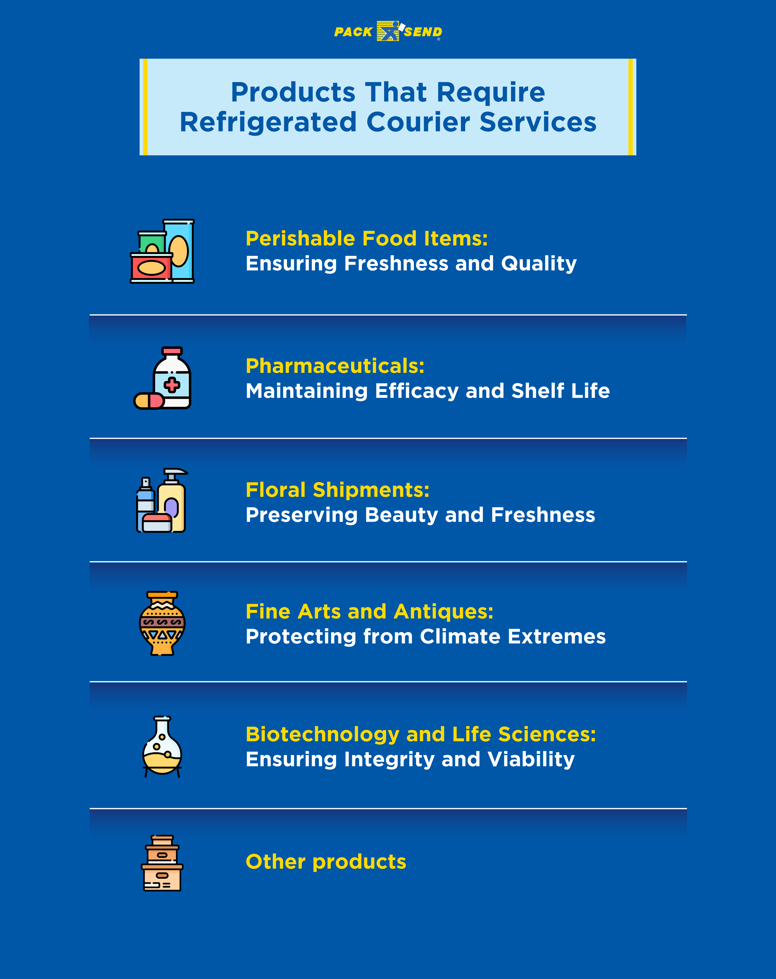
Top 7 Challenges in Refrigerated Delivery
1. Weather and Climate Fluctuations
The unpredictable nature of weather and climate poses significant bottlenecks in refrigerated delivery. Extreme heat, cold spells, and unexpected temperature changes can influence the interior temperature of the truck, even with refrigeration in place.
To counter this, refrigerated couriers employ real-time tracking and monitoring systems, allowing them to make timely adjustments to maintain the desired temperature.
2. Traffic and Route Inefficiency
Navigating through congested roads and inefficient routes can lead to delays in delivery. Refrigerated couriers must carefully plan their routes and consider traffic conditions to ensure on-time deliveries without compromising temperature integrity.
3. Access to a Reliable Workforce
According to Australian Trucking Association CEO David Smith, the trucking industry in Australia is facing a severe staff shortage. This shortage affects not only drivers but also mechanics and administrative staff. Although new people are joining the industry, they're not coming in fast enough to replace the experienced workers leaving.
4. Higher Fuel Prices and Operating Costs
Refrigerated couriers are facing rising fuel and operating costs. The unstable fuel prices make budgeting challenging, while equipment and materials costs also keep increasing. Acquiring equipment and materials becomes more complex, leading to longer delivery times and uncertain operations planning.
5. Getting the Right Technology
Refrigerated courier operators know how crucial it is to update their technology for safe and quality shipments. This includes IT systems, real-time data solutions, and remote temperature monitoring for drivers. But, tight budgets and infrastructure hurdles can make staying high-tech challenging in refrigerated delivery.
6. Tricky Loading and Unloading Operations
Loading and unloading are crucial stages in refrigerated delivery. The goal must be to minimise or altogether avoid contact with the outside temperature during these transitions.
However, refrigerated trucks can't stay in the cold storage area during these operations. Instead, products must be moved between the container and the refrigerated warehouse.
This movement exposes temperature-sensitive goods to improper conditions. To prevent this, freight shipping companies must have the right resources and skilled personnel to move goods between these points efficiently.
7. Political, Socioeconomic or Environmental Disruptions
Refrigerated couriers face additional challenges like cyber threats, global conflicts, and natural disasters. Cyber attacks pose a constant danger, demanding increased investment in systems and employee training. Geopolitical conflicts, like Russia's actions in Ukraine or tensions between the US, China, and North Korea, disrupt routes and delay supply chains. Natural disasters like earthquakes and tornadoes also affect chilled transport operations.
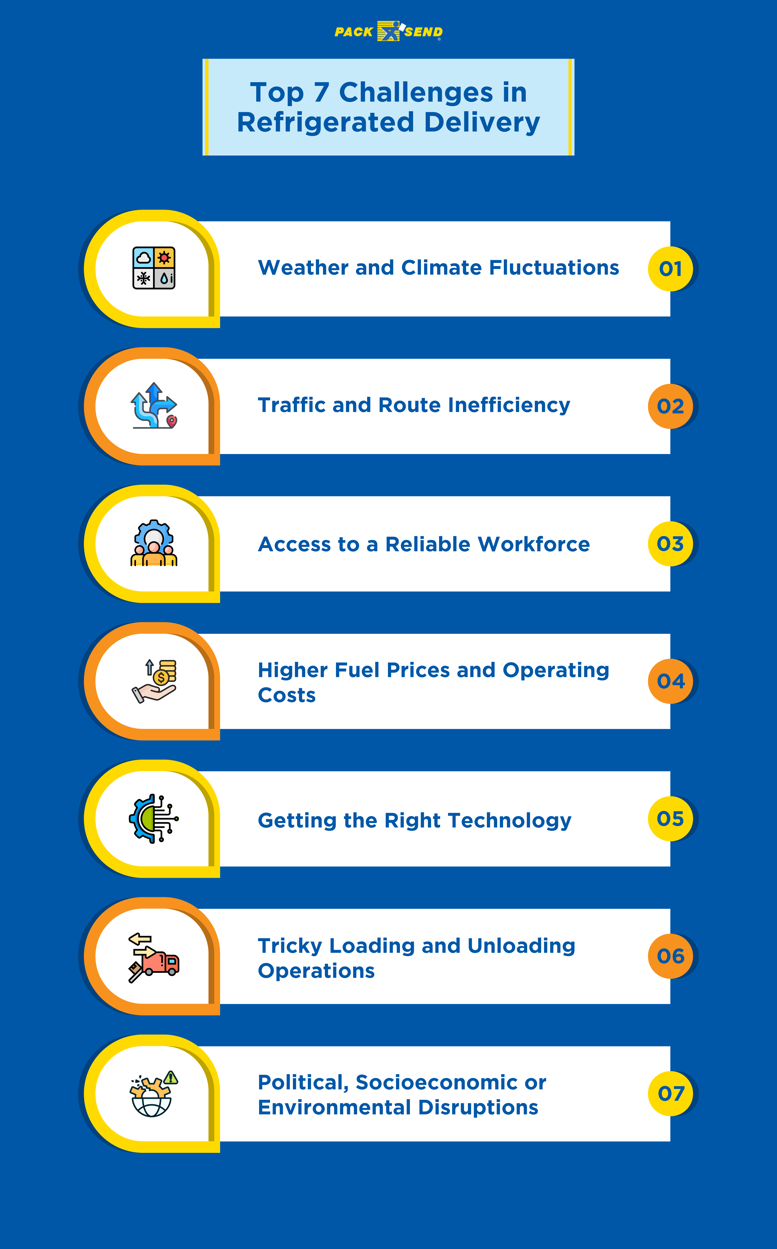
Choosing the Right Refrigerated Courier
When looking for a refrigerated courier service, consider these key factors to secure the best fit for your business needs. Your aim is to deliver your goods from A to B in the same condition they were sent. Remember that research is your ally in finding a dependable refrigerated courier that guarantees your goods' top-notch arrival.
1. The Carrier's Experience and Expertise
When choosing a refrigerated courier, experience matters. Look for seasoned couriers with a proven track record in handling temperature-sensitive shipments. Check their online reputation on social media for valuable insights into their reliability and efficiency. Remember, a reputable courier ensures your goods are in safe hands.
2. Proper Licensing and Compliance with Regulations
Refrigerated couriers must comply with industry regulations and possess the necessary cold-chain licences and certifications. Verifying the courier's compliance ensures that your shipments are handled following best practices and legal requirements.
3. Available Temperature Range
Refrigeration is different. Even a slight temperature change can affect your cargo's quality and how long it lasts, especially for perishable items. Remember to check the offered temperature and the monitoring system for refrigerated logistics delivering dependable services.
4. Availability of Tracking and Monitoring Systems
Transporting your perishables globally can be tricky, especially when they're sensitive to changing conditions. A remote monitoring system can monitor your cargo's journey, ensuring it's safe and sound from container loading to doorstep delivery. So, ensure that the transport company offers the necessary visibility and transparency.
5. Refrigerated courier prices
Before you decide, gather quotes from various refrigerated transport companies. Remember, the lowest price doesn't always mean the best quality, reliability, or service.
6. Customer Reviews and Testimonials
Reading customer reviews and testimonials can offer valuable insights into the quality of service the refrigerated courier provides. Positive feedback and satisfied customers serve as signs of dependable and trustworthy service.
Environmental Sustainability in Refrigerated Couriers
Transportation releases billions of tons of greenhouse gases every year into the air. Since 1970, emissions have tripled due to population and economic growth. It now makes up 20% of global CO₂ emissions and ranks as the second-largest source of carbon pollution globally. The refrigerated cargo carrier fleet alone emits 81.9 grams CO₂ per TEU-kilometre. Consequently, the refrigerated transport sector in Australia is now aligning with the global call for sustainability.
Energy Efficiency
Energy consumption is a significant focus, as refrigeration units demand substantial power. To combat this, forward-thinking courier companies are embracing energy-efficient technologies. Innovative approaches are curbing energy usage and costs from advanced insulation to low-emission refrigeration systems.
Alternative Fuels
Conventional diesel-powered trucks contribute to pollution and carbon emissions. The solution? Embracing cleaner alternatives like electric and hybrid vehicles. With zero tailpipe emissions, electric refrigerated trucks improve air quality and shrink the carbon footprint. Australia's shift towards electric and hybrid vehicles is fortified by robust charging infrastructure and governmental incentives.
Eco-conscious Refrigerants
Proper handling of refrigerants is vital for eco-friendly refrigerated transport. Harmful refrigerants like hydrofluorocarbons (HFCs) are being replaced with better options. Hydrofluoroolefins (HFOs), carbon dioxide (CO2), and ammonia are greener choices, reducing environmental harm and meeting regulations.
Electric and Hybrid Refrigerated Vehicles
Electric and hybrid refrigerated vehicles are emerging as greener alternatives to traditional diesel-powered trucks. These vehicles reduce emissions and noise pollution, creating a cleaner transportation ecosystem.
Role of Technology
Advanced monitoring systems and telematics are crucial in optimising energy, tracking temperatures, and improving operations. Real-time monitoring, proactive maintenance, and data-driven insights are used to prevent spoilage, reduce waste, and inform decisions for ecological sustainability.
![]()
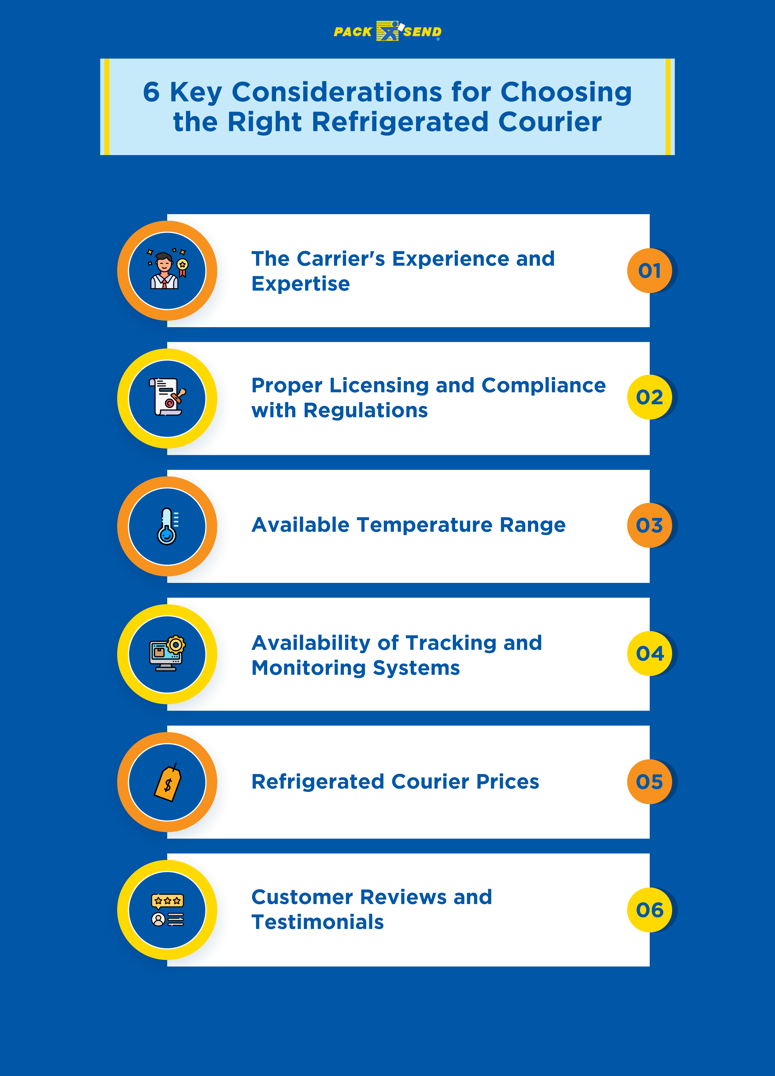
Conclusion
In the world of shipping sensitive goods, refrigerated couriers are the protectors of freshness and quality. From juicy fruits to vital medications and fragile art, these experts ensure your items arrive safely.
The rise in demand for refrigerated couriers mirrors our modern need for precise and reliable services. With tech advancements and skilled professionals, the cold chain logistics industry continues to evolve, safeguarding the essence of your shipments.
Ready to go the extra mile with PACK & SEND’S Shipping Solutions?
Explore the expertise of PACK & SEND, a distinguished courier and freight provider. While PACK & SEND does not offer refrigerated courier services, its expertise as a specialised logistics provider brings immense value to businesses across industries. We ensure that your delicate products reach their destination in pristine condition.
With PACK & SEND's vast experience handling diverse shipments, businesses can rely on their extensive network and efficient logistics solutions to reach new markets and customers. Our commitment to compliance and industry regulations ensures that goods are transported safely, adhering to strict handling protocols. With cutting-edge technology, real-time tracking, and reliable customer service, we are the ideal choice for businesses seeking seamless transportation solutions.
Discover the PACK & SEND advantage and elevate your shipping journey. Partner with us for a future where your goods are not just transported, but cared for, every step of the way.
Curious to learn more about our offerings for courier and freight services? We're excited to discuss your specific logistics requirements at any time. Feel free to contact us – we're here to assist!
Frequently Asked Questions (FAQs)
What is a refrigerated courier?
A refrigerated courier is a specialised courier service delivering temperature-sensitive goods. It uses temperature-controlled vehicles and technologies to maintain products under optimal conditions.
Which products require refrigerated courier services?
Refrigerated couriers are vital to preserving the quality and safety of products. They are especially crucial for items that require specific temperature conditions. Such as—
-
Fresh produce (fruits, vegetables)
-
Dairy products, meat, and seafood
-
Pharmaceuticals (vaccines, medicines)
-
Biological samples
-
Certain chemicals
-
Artwork, antiques, and valuable items
-
Flowers, and many more
How do refrigerated couriers ensure proper temperature control during transit?
Refrigerated couriers maintain a consistent temperature using specialised vehicles and containers. They also rely on advanced temperature-monitoring technology for precise control.
How can businesses choose the right refrigerated courier?
Businesses should take into account the courier's experience, customer reviews, and compliance. They should also ensure the access to tracking systems to make an informed decision.
